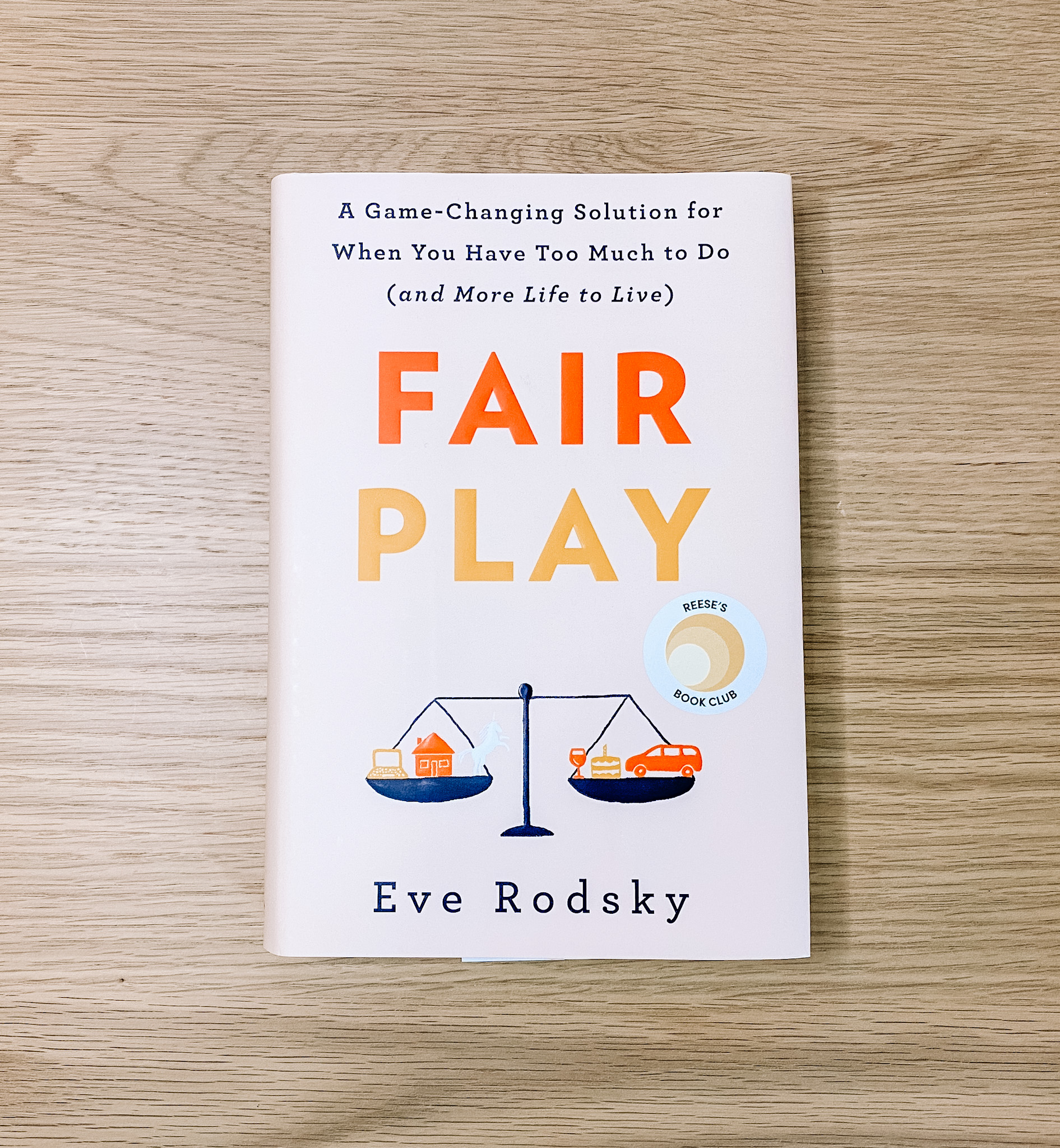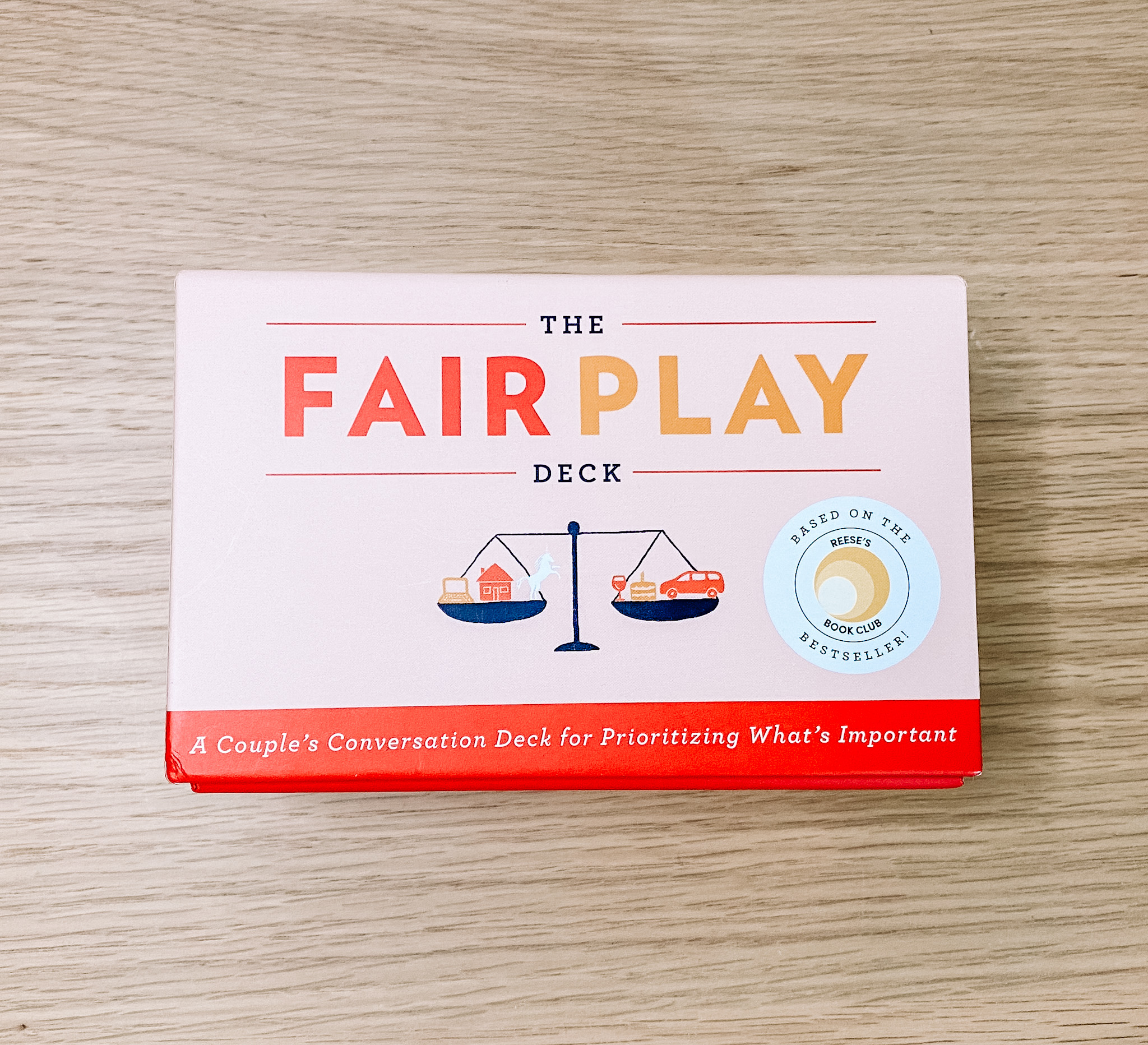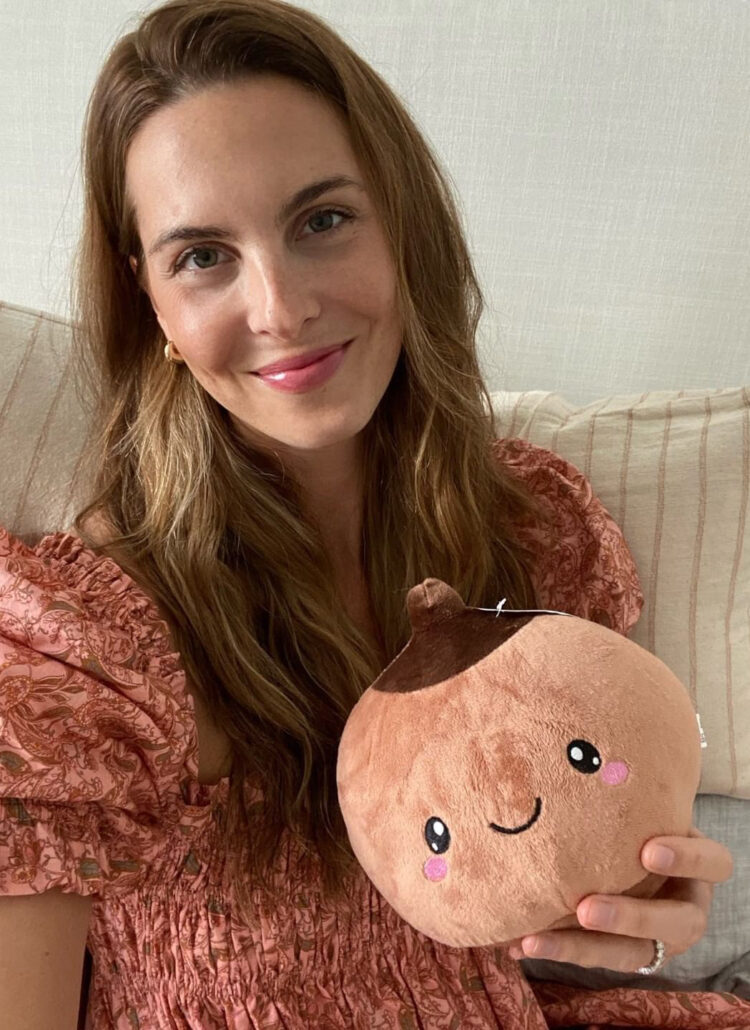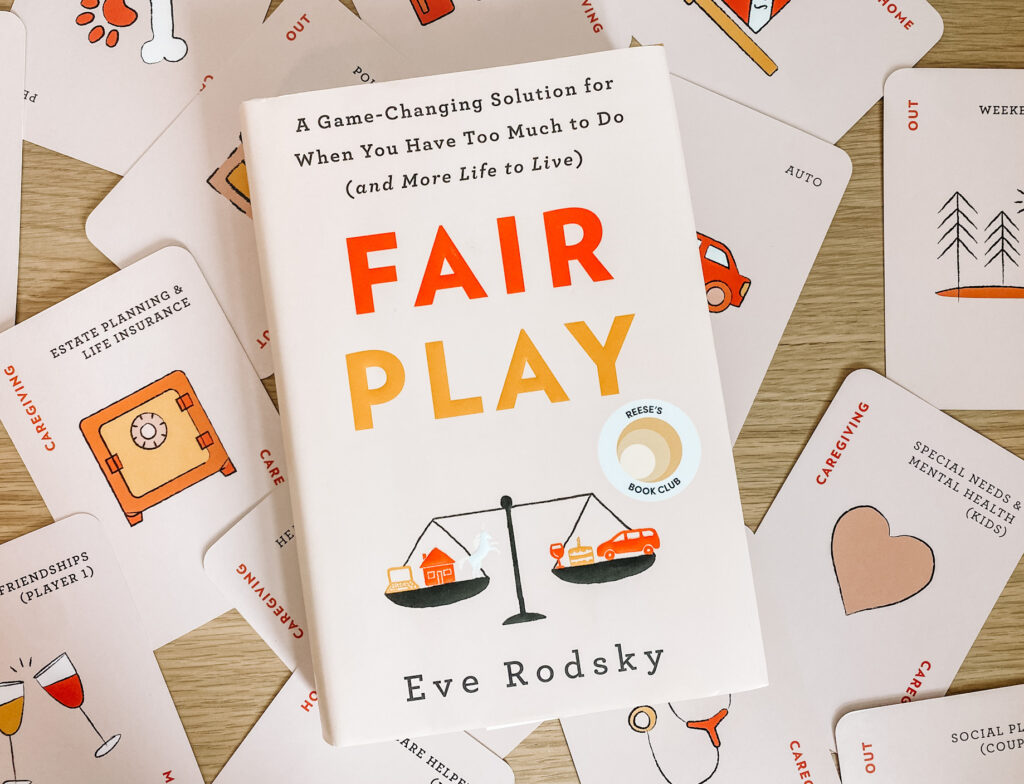
How this Communication Tool can Bring Ease into Your Postpartum Domestic Life
The Fair Play Method was developed by lawyer, Eve Rodsky, after her background in family mediation, strategy, and organizational management helped her realize she could solve a problem right in her own home. What began as a Sh*t I Do list passed amongst friends, grew into 10 years of research with professional experts, the creation of a book to outline the struggles and solutions for common household issues, and finally, the Fair Play Method. The Fair Play Method is the result of years of listening to and truly understanding what many partners are feeling in their homes on a daily basis. The Fair Play Method supports the conversations and time management skills that can help families and the individuals within them, flourish. And, in my opinion, there is no greater time to have these discussions than when preparing for a new family member.
How The Fair Play Method Works
The Fair Play Method uses a 100 card deck to divide common household responsibilities amongst you and your partner, or even between you and any caretakers supporting your family. Each card in the deck represents one household task and the deck is comprised of five different categories including Home, Out, Caregiving, Magic, and Wild, plus one Unicorn Space card for each partner. The cards are used to improve communication, clarify expectations, and allot more time to do the things we all prefer to do. Imagine spending more quality time with your family or finally finding four hours on a Sunday afternoon to share your unique talents with your community (this is defined as Unicorn Space in the book – more on this elusive creature later this month…)
Categories of the Fair Play Card Deck
The five categories of the card deck are Home, Out, Caregiving, Magic, and Wild and each partner has one Unicorn Space card. When you begin, you can start with as many or as few cards as you wish and each family can use as many or as few of the 100 cards they choose. This is where your family’s unique needs come into play. You and your partner can create your own deck based on what your life looks like. For example, a couple with no children may use up to 60 cards in their household, and a couple with children may use the additional 40 cards. There are 30 daily grind tasks split across the entire deck.
The Four Rules of Fair Play
As with any game, there are a few rules to remember in order for all players to feel like everything is fair and square.
Rule #1: All Time is Created Equal.
No one person has more time to work with in their day than another, regardless of race, gender, sexual orientation, socioeconomic status, etc. In order to support the goal of Fair Play, we must first respect one another’s time as finite, and the value it holds in regards to each person’s true sense of fulfillment in life. If you’re having trouble with this concept, feel free to check out my Fair Play Consultation offering to discuss.
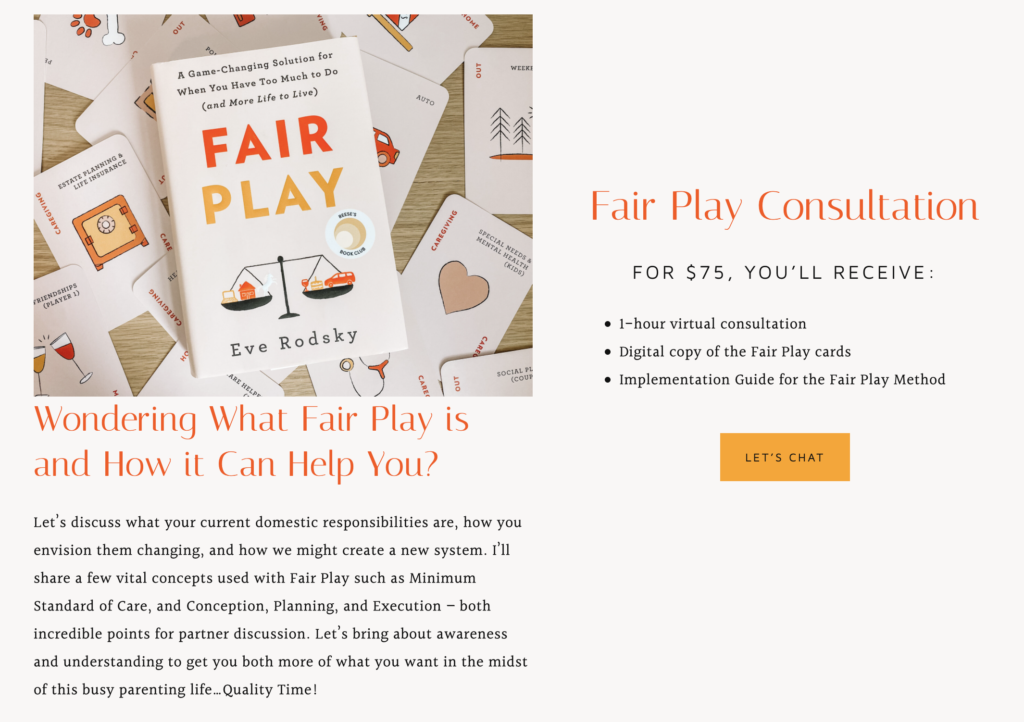
Rule #2: Reclaim Your Right to Be Interesting.
When we get lost in the shuffle of everyday life and all of its responsibilities, oftentimes the first thing we let go of are the pursuits that we are uniquely interested in. These activities are the things that make us interesting, the projects that make us light up, and the gifts that we share with our communities that are distinctive to us as individuals. These pursuits are important.
Besides having a system to reduce the mental workload, communicate more efficiently, and eliminate resentment with our partners, these individual and unique pursuits (again, Unicorn Space) are what we are organizing time for with the Fair Play method. I want you to remain close to the you that makes you sparkle and to continue to share that special something that I know you have with those around you.
Rule #3: Start Where You Are Now.
Consider your goals for your home, partnership, and future. Think about where you are now, how you are feeling on a day-to-day basis with your current set up, and then envision how you would like it to change, if at all. You can use Fair Play to take small steps personally, to begin a conversation with your partner about how you envision your family dynamic changing for the better, or begin playing with all 100 cards of the deck tomorrow. Following any of these avenues can work. It’s all about using the system in a way that best supports you and your family. If you and your partner are hitting some speed bumps and need some help fine-tuning your Fair Play gaming skills, check out my Fair Play Accountability service and I’ll help you get back on track!
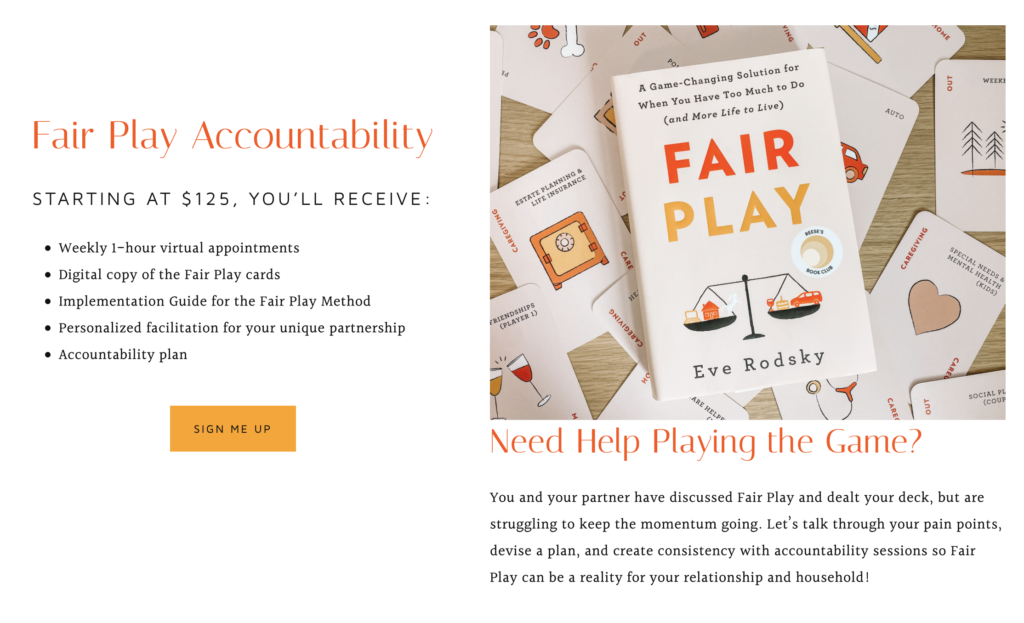
Rule #4: Establish Your Values and Standards.
This rule is essential for gaining the mutual respect we talked about in Rule #1. Nailing this rule looks something like this scenario: Discussing the fact that you prefer to to wipe the kitchen counters with a disinfectant after every meal because you value your family’s health, the hygiene of your home, and your child’s consistent community presence in school and social settings. The Values here are health, hygiene, and community presence. The Standard is wiping the kitchen counter with disinfectant after every meal. Discussing these values in relation to a task can take a scenario that may have once been seen as a “nag”, to one in which there is a mutual understanding of shared values for your family, and therefore, mutual respect.
Discussing each partner’s values for any given card that may feel especially important for them will help you create Minimum Standards of Care (more on this later as well). Establishing these can alleviate resentment (when you just don’t feel like doing the thing your partner is always reminding you to do) and instead, help to create a mutual goal because of your shared values. And, in the case that you do not have shared values on a particular task, there is the option for the person with said values to solely Hold that card (more on this later as well). These concepts are sometimes more fun to discuss in a group setting to gain perspective on the fact that so many couples deal with these issues! If you are interested in speaking in a group format, maybe my Fair Play Community offering is right for you.

How Fair Play Benefits Postpartum Planning
If you are familiar with my practice, you know I like to take a woman’s entire world into scope when supporting the growth of her family. Considering how a home is run on an everyday basis, the decisions made from moment to moment and all of the acts in between is part of that process. Most importantly, how each of these acts make us feel are so closely tied to our sense well-being. My goal is to help elevate your sense of ease and fulfillment in life. Having open communication with our partners, getting clear on our goals, and clarifying our shared values not only help to run a household more smoothly, but also help to create the mutual respect, support, and care in our relationships that, I believe, most of us desire.
When you are bringing a new little person into the world, you have a great opportunity to assess your past, present, and future, and decide which aspects of your life you would like to share with your family. I was personally drawn to the Fair Play method when I took the time to envision how I wanted my future children to view the relationship my husband and I share. What would I want them to see? What would I want them to desire for themselves in their futures? The moment you decide to begin a family is the perfect time to consider these questions and take steps to create the family dynamic in your home that you envision for yourself and for the people you love most in the world. And, it’s also never too late to start. Access to postpartum planning can be found on my Doula services page, if you’re interested!
How to Learn More About Fair Play
If you’re curious about my Fair Play service offerings, feel free to explore them here. And, if you would like to read the book or create a deck for your household, you can find both below. An audio version of the book is also available, as well as Eve Rodsky’s podcast, Time Out, which uses each episode to take a deep dive into Fair Play concepts.
Much Love,
